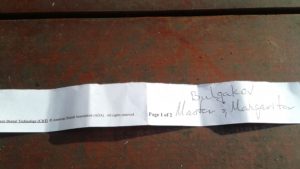When the hygienist said it would be a few minutes, I reached into my bag for a book or story packed for such an occasion—a few stolen moments of reading. Olive Kitteridge by Elizabeth Strout mingled there in my oversized and heavy purse with my Nook, spare change and crumpled receipts. My short story group selected the book to examine short stories compiled into a novel.
A World Literature Illiterate
The dentist’s usual routine—rush in, smile, check teeth, smile, rush out—stopped at the sight of my book. He asked, “What are you reading?”
I told him about the short story group.
“If you want to read the best short stories, you should read Russian authors,” my Russian dentist said.
“Our study group reads mostly American authors,” I said, embarrassed at my limited knowledge. I hadn’t read many of the American writers until I joined the group several years ago. My discovery of authors like John Cheever, Tobias Wolf, Antonya Nelson, George Saunders and Jhumpta Lahiri was still new and fresh.
I remembered a few foreign authors. “We read James Joyce—Irish.” Dubliners, of course, duh. “And Gabriel Garcia Marquez—South American.”
The dentist sighed and examined me through his ultra-magnified glasses zooming into the tiniest imperfections in my teeth, pores in my skin and crevices of my soul. “If you want to read a real story, read Chekov, the greatest short story writer.”
Required Reading
A few months later, I visited the dentist again. Study guide in hand and prepared to redeem my reputation, I announced, “We’re studying Chekov this month. And this one.” I point to the page. “He’s Russian too?”
“Nabokov. Yes, he’s Russian.” The dentist, his eyes downcast, said nothing more.
“Have you read ‘The Woman with the Dog’ by Chekov?”
“Yes, yes, of course. At my home in Russia, we had a library of more than three hundred books. First edition books. Valuable, but all stolen.”
I imagined his family living in Russia during the cold war years and wondered what forced them to leave. “Do you want to read our lesson? We’re studying stories retold or written in homage to another work. The Chekov story is recast by the author Joyce Carol Oates. And Lorrie Moore writes ‘Referential’ based on Nabokov’s story. Have you read ‘Signs and Symbols’ by Nabokov?”
He looked at me again through those magnifying lenses attached to his glasses, piercing through my ignorant American inquiry. “I read it in eighth grade.”
I tried to remember what I read in eighth grade, on those late nights sitting in my bean bag chair next to a pole lamp I rescued from the trash. My middle school friends swapped vampire novels and other contraband. My college-aged brother left behind his anti-war books like Trumbo’s Johnny Got His Gun.
But what did I read in school? Did I read in school? Overall, my eighth grade literature was entirely forgettable compared to what I read at home after my parents went to sleep. My dentist’s superior schooling trumped the American mandates for my entirely forgettable eighth grade year.
Biased To Domestic
My dentist politely declined my outline and expressed no interest in the other writers. Instead, he tore a scrap of paper from my file, unfortunately not the part with the amount I owed him, and wrote Bulgakov and his novel shown in the photo above. “This is the best. Read this.”
The conversation haunted me for several weeks until I studied an article about Americans bias to invest domestically when greater returns existed elsewhere. I wondered if greater reading returns came from abroad also. There was only one way to know.
The idea of reading the best of Russian writers piqued my curiosity and is one of my New Year’s resolutions. About Chekov and Nabokov, my dentist later confessed that he wanted the literature in Russian and not translated into English. I sympathized, hoping he can read some English, because I was trusting this guy with my teeth.
TAGS:

Great post! A good reminder to try to have a more world view in our literary consumption!
Karen, excellent blog. I always learn from you.
Karen, I admire the passion your dentist and you have for literature. It’s interesting to me that you were so quick to act upon his suggestions and read Chekov. In turn, I wonder if your dentist is investing in reading beyond the Russian masters.